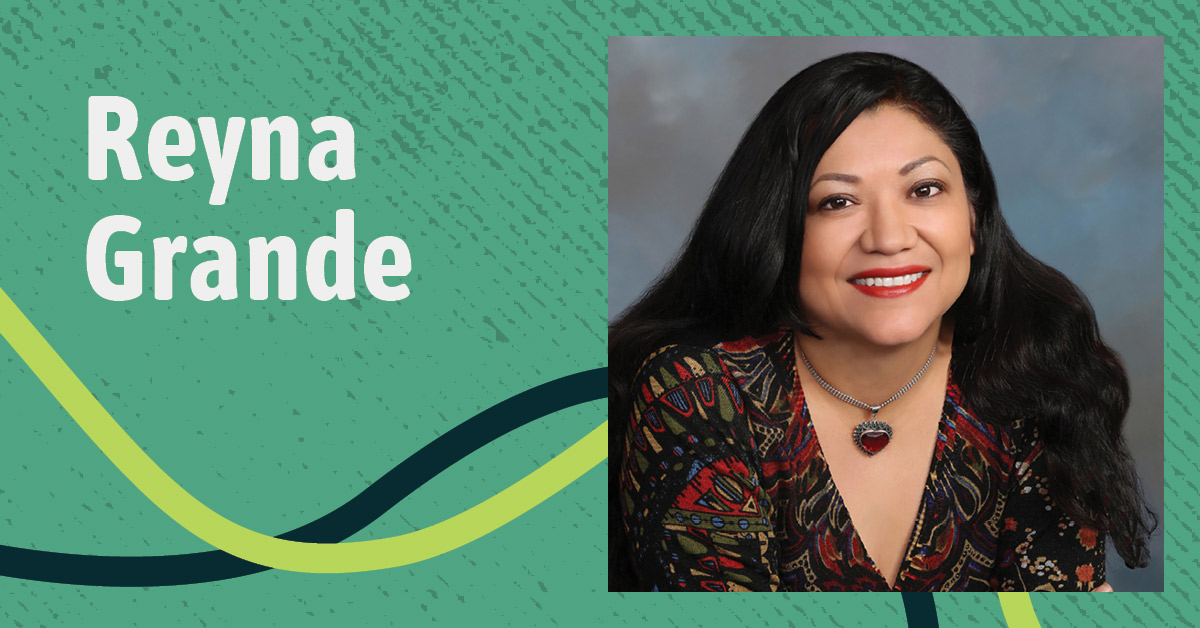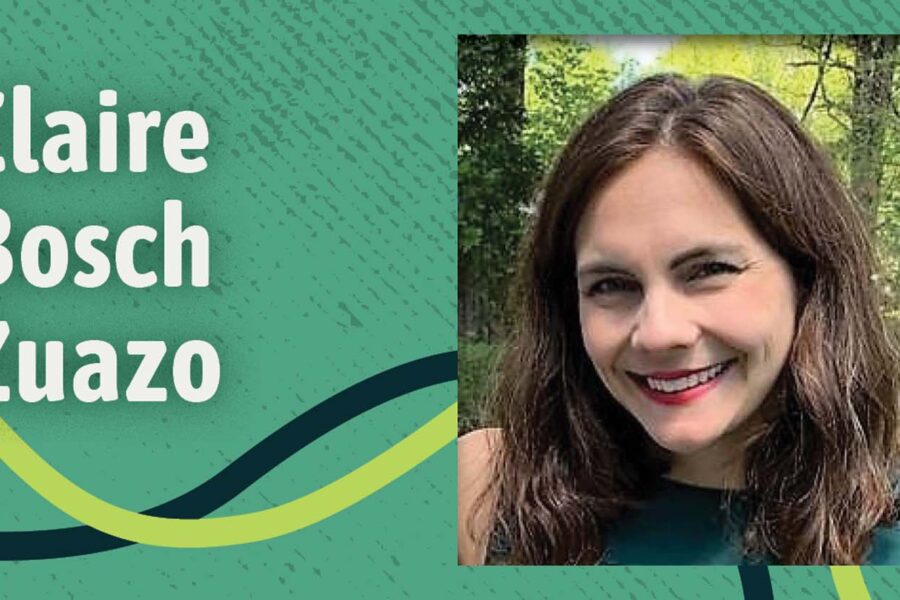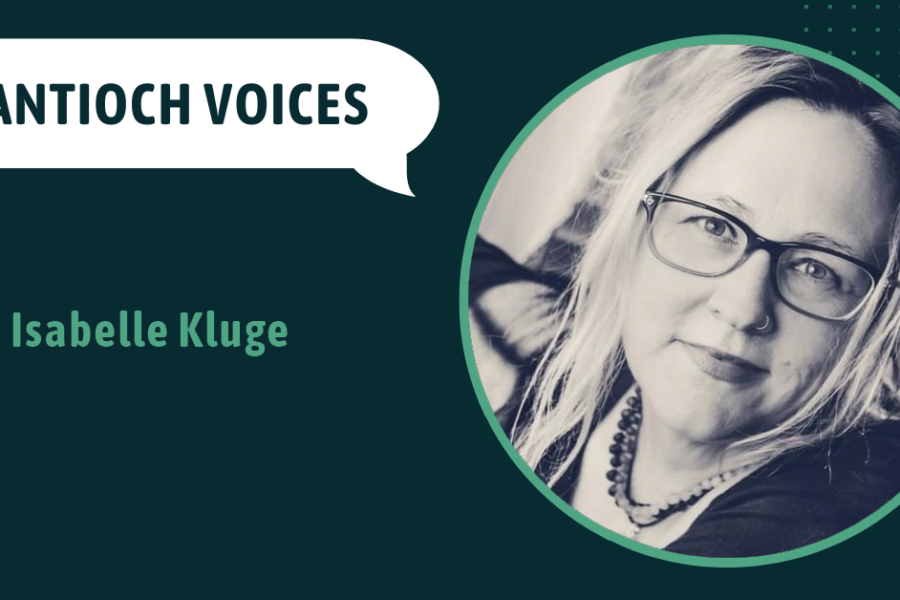When Reyna Grande walked into this year’s Texas Book Festival, she was greeted with hugs and exclamations. Everywhere she went, someone was excited to see her. People knew who she was.
This wasn’t the case ten years ago. “When my first book came out,” she says, “I was the new kid on the block. No one knew who I was.” For Grande, an alum of Antioch’s MFA in Creative Writing who now teaches in that same program, all it has taken is sixteen years of hard work, building relationships, and publishing numerous books to claim her space in the writing world.
Back when she was a bookish kid herself, Grande didn’t imagine someone with her background could be a professional writer. As a nine-year-old, she immigrated to the United States, following her parents from Iguala, Guerrero, to Los Angeles, California. Once in the U.S., she faced difficulty finding her footing amidst a culture that dehumanizes immigrants. But now, writing is the center of her life. Grande’s first two novels, Across a Hundred Mountains and Dancing With Butterflies, and her memoirs The Distance Between Us and A Dream Called Home, draw from these experiences of crossing the border and making a new life as an undocumented immigrant. And her most recent novel, A Ballad of Love and Glory, is historical fiction and, in part, looks at how these borders came to be drawn in the first place.
But being a writer is not always an easy occupation. Grande has to carve out time to write her books amidst travel, teaching, family obligations, and life’s ever-accumulating duties. Her story shows how being a writer who can rely on their writing as a primary income takes more than getting the words on the page.
Shaping and Being Shaped by Mentorship
Over the years, mentorship has changed the trajectory of Grande’s work more than once. When she was a student at Pasadena City College, an English teacher was struck by the strength of her essays and encouraged her to keep writing. This was an important shift. As a child, Grande faced ridicule when people projected stereotypes because she had a Mexican accent. Writing helped her convey her ideas without this layer of discrimination. “When I wrote, you couldn’t tell that it was an English-language learner who wrote it,” she says. “So writing was my favorite way of expressing myself.”
This teacher helped her believe it could be bigger than pages in a journal. “I didn’t see myself as someone who could pursue a career as a writer, but part of that was because I didn’t really grow up reading Chicano and Latino writers,” Grande says. The teacher introduced her to writers like Sandra Cisneros and Isabel Allende. Grande says, “Once she started giving me these books, that was proof that they did exist, that they were there. And I thought, ‘Well, if this book is real, then maybe my dream could be real.’”
To follow this dream, Grande enrolled as an undergraduate at UC Santa Cruz. But when she entered the creative writing program, she struggled, often finding herself one of two students of color in the classes. The lack of diversity in required readings and in the classroom made her question the path she was choosing.
Then, in her Chicano literature class, a teacher started reading her work and providing feedback, telling Grande it deserved to be shared. “Because of her mentorship and her guidance, I stuck with the creative writing program,” Grande explains. “And I was able to push against whatever discrimination I was feeling at the time.”
After graduating, she wanted to develop her craft further, and she enrolled in the Antioch MFA. At Antioch, she found another mentor, Leonard Chang, who helped push her work into new directions. “When I worked with him, my second novel got bigger and longer and longer and longer,” Grande says. “He was always telling me I have to linger more in the scenes and have to dig deeper with the characters.” Even after graduating, the two stayed in touch. Eventually, he helped Grande apply this advice when she started writing about her life. “He helped me understand the difference between a memoir and an autobiography,” she explains. “He helped me figure out that book, so I’m very grateful for his mentorship as well.”
Mentoring and Publishing as a Marginalized Writer
Now, ten years later, Grande is back in the MFA program, this time as a mentor herself.
Grande approaches her mentorship with firsthand knowledge of publishing as a writer from a systemically disenfranchised community. In the years since her books have come out, she finds herself often traveling to promote her work in classrooms and fairs. “I think that writers tend to neglect that part,” she says, “And I understand it because it’s really hard to constantly be out there talking about these things. It takes an emotional toll.”
For Grande, this toll can be especially intense because of the traumatic events she recounts in her books. It can be difficult to retell these stories and answer questions about them so often. But it also offers her the opportunity to share her work.
Sometimes the connection readers have to her previous works can feel like it constrains what she can write about, moving forward. “I feel that sometimes readers really fall in love with specific themes that you’ve written,” she says. “Then that’s what they want you to keep talking about.” It’s a catch-22 that Grande has become accustomed to, and she has found her own ways through it.
Even now, with the publication of her new book, she finds this dynamic emerging. “I want to talk about the novel; I want to talk about the history, I want to talk about the politics,” she says. “But it always goes back to talking about my inner turmoil about my immigrant identity.” As a mentor, Grande wants her students to be prepared for this. “I want them to get used to being able to go out into this industry; that is not going to be kind to them, that is not going to treat them so nicely,” she says. “I want them to develop that inner strength that you need.”
This is especially true for writers with marginalized identities. But this inspires Grande to support them in their writing craft even more. “No matter what their cultural background is, I focus on the quality of the work,” she says. “I try to make sure that they’re all striving to get better, to be more ambitious with their projects, to push themselves harder.” Grande is always pushing herself in her own writing too, a process she’s developed over the years to create work that’s therapeutic for her—but that is also compelling to read.
Balancing—and Combining—Life and Writing
When Grande sits down to write, she prefers to be tucked in her office at night, alone with her stories in the quiet and the dark, while the rest of her family sleeps. “I feel that I enter a dream,” she says. “Because a lot of times, honestly, I read my work, and I don’t even remember writing it.” But she’s also taught herself to tap into the creative part of her brain while she’s on the move, in airplanes, hotels, and coffee shops, using what time she has to build her worlds.
When she first started writing, she used novels as a way to write about her life before and after immigrating to the United States. This gave her the protection of fiction—her characters weren’t real people. Later, when she began writing her memoirs, the skills she learned to develop characters and plots returned to help her again.
Her writing also comes in stages. “The first draft that I do, it’s always for me,” she says. She sees this “as a way for me to use my writing as therapy and healing.” But eventually, she starts working to revise and polish these first drafts. As she says, “If you’re going to publish that, you need to approach it from a writerly perspective.”
With her memoirs, her first draft was often confessional. She used it to get out anger and frustration: at the poverty, she lived through, at having to cross the border with her siblings, at her parents for having left them. It felt good to get it all out on the page, but it wasn’t how she wanted to present the story to the world. As she says, “You have to think, ‘What is your own personal story telling about a larger social, political, historical context? How does it fit into that? And what is your reader gonna take from reading this?’ Those are difficult questions, but you have to ask them.”
These questions and tools she used from fiction, like developing a narrative, compelling characters, and setting, helped shift Grande’s work from personal testimony to a memoir. Her mentor at Antioch, Leonard Chang, read early versions and helped Grande shape it into a story.
The questions posed by the writing process added a new sense of understanding about her family. “I had written about them from a daughter’s perspective, but now I had to write about them from a writer’s perspective,” Grande explains. “So I started to think of my parents as characters in the book. And when you create characters, you have to give them their three dimensions.” Through this work, she more deeply considered the social and psychological impacts of her parents’ lives and how these factors shaped the decisions they made.
Grande has three books that came together over the pandemic. In addition to her novel of historical fiction, she edited an anthology featuring authentic stories of diaspora and migration called Somewhere We Are Human, which was released in June this year. Next May, her third pandemic book will come out–Spare Parts: The True Story of Four Undocumented Teenagers, One Ugly Robot, and An Impossible Dream, which is her adaptation of Joshua Davis’ bestseller for young readers. Now she’s given herself some time off from starting a new project because she has dedicated this year to publicity and connecting with the community.
“It’s reaching people, and touching them, and changing their lives sometimes,” Grande says. “So my readers are a constant reminder about why I need to keep doing the work that I do.”





